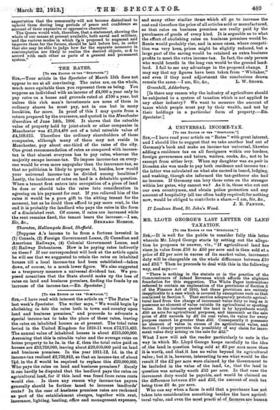[To TRW EDITOR OF TEl "SIIICTAIOR:"1
Sra,—I have read with interest the article on " The Rates" in last week's Spectator. The writer says, " We would begin by abolishing in tote the rates both in town and country upon land and business premises," and proceeds to advocate a Special income-tax to take the place of these rates, leaving the rates on inhabited houses as at present. The total rates levied in the United Kingdom for 1910.11 were £73,175,493. -The annual value of inhabited houses is about £215,000,000. Assuming that this is rateable value and the average rates on house property to be 5e. in the £, then the total rates paid on houses are £53,750,000, leaving about £20,030,000 paid on land and business premises. In the year 1911-12, ld. in the £ income-tax realized £2,738,912, so that an income-tax of about 70. in the £ would be required to replace this £20,000,000. Who pays the rates on land and business premises? Surely it can hardly be disputed that the landlord pays the rates on agricultural land,,for if this. land was freed from rates rents would rise.. Is there any reason why income-tax payers generally should be further. taxed to increase landlords' rents? In the case of "business premises rates are reckoned as part of the establishment charges, together with rent, insurance, lighting, heating, office and management expenses,
and many other similar items which all go to increase the cost and therefore the price of all articles sold or manufactured, so that rates on business premises are really paid by the purchasers of goods of every kind. It is arguable as to what the effect of abolishing rates on business premises would be. Rents would probably rise, and in some cases, where competi- tion was very keen, prices might be slightly reduced, but a large part of the saving would be retained as extra business profits to meet the extra income-tax. In fact, the only person who would benefit in the long run would be the ground land- lord. I fail to see any advantage in the proposed change. I may say that my figures have been taken from "Whitaker," and even if they need adjustment the conclusions drawn remain the same.—I am, Sir, &c., L. W. STONE. Greenhill, Adderbury.
[Is there any reason why the industry of agriculture should be subjected to a system of taxation which is not applied to any other industry ? We want to measure the amount of taxes which people must pay by their wealth, and not by their holdings in a particular form of property.—.En. Spectator.]














































 Previous page
Previous page